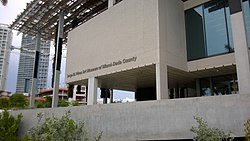Pérez Art Museum Miami
 |
|
| Established | 1984 |
|---|---|
| Location | 1103 Biscayne Boulevard Miami, Florida, United States 33132 Formerly at: 101 West Flagler Street |
| Coordinates | 25°47′09″N 80°11′12″W / 25.785894°N 80.186705°W |
| Type | Art museum |
| Visitors | 150,000 (2013-2014) |
| Director | Thom Collins |
| Curator | Tobias Ostrander |
| Public transit access | Museum Park station (Metromover), Metrorail via Metromover transfer at Government Center station |
| Website | www |
The Pérez Art Museum Miami (PAMM) is a contemporary art museum that relocated in 2013 to the Museum Park in Downtown Miami, Florida. Founded in 1984 as the Center for the Fine Arts, it became known as the Miami Art Museum from 1996 until it was renamed in 2013 upon the opening its new building designed by Herzog & de Meuron at 1103 Biscayne Boulevard. PAMM, along with the $275 million Patricia Frost Museum of Science and a city park which are being built in the area with completion scheduled for 2015, is part of the 20-acre Museum Park (formerly Bicentennial Park).
Since the opening of the new museum building at Museum Park, the museum has seen record attendance levels with over 150,000 visitors in its first four months. The museum had originally anticipated over 200,000 visitors in its first year at the new location. At its former location on Flagler Street, the museum received on average about 60,000 visitors annually.
Pérez Art Museum Miami (PAMM) is directly served by rapid transit at Museum Park Metromover station.
The Center for the Fine Arts opened in the downtown Miami-Dade Cultural Center, a 1983 Spanish-style barn and the first of three buildings to be unveiled in a $24 million county-owned complex designed by Philip Johnson. The museum was built at 101 West Flagler Street in the same Miami Cultural Plaza as HistoryMiami and the Miami-Dade Public Library. The opening's delay of more than a year was occasioned by a $16.5 million renovation of the smoke evacuation system for the complex. Founded as a hall for traveling shows, the $6 million fine arts center did not start acquiring art until 1996. But its efforts were constrained by little storage or exhibition space. The Miami Art Museum was founded in 1996 as a successor to the Center for the Fine Arts.
In November 2010, construction began on the new MAM building in Museum Park in Downtown Miami. The building is designed by Swiss architects Herzog and de Meuron, who were hired by Terence Riley, director of the museum in 2009, when plans were made. The structure is meant to resemble Stiltsville, which is the name given to a group of wooden houses built on stilts that stand off the coast of Key Biscayne in Biscayne Bay. The new museum building was built alongside the new Miami Science Museum building at the redesigned park. The three-story building has 200,000 square feet, composed of 120,000 interior square footage, and 80,000 exterior square footage. Inside the museum, display spaces can be illuminated by floor-to-ceiling windows, which can also be blocked off. Otherwise the rooms get clinically even light delivered by strips of fluorescent tubes, though spotlights can also be used. A grand staircase — nearly the entire 180-foot width of the platform — connects it to the waterfront. Thick, sound-absorbing curtains cordon off one large or two small areas of the stair for programs. With their raised, wraparound terraces and broad overhanging canopies, the houses are conceived to withstand hurricanes and floods, while providing ample shade and ventilation. The museum also incorporates a series of hanging vertical gardens made from local plants and vegetation, designed by French botanist Patrick Blanc. The new MAM building opened in December 2013, and the Miami Science Museum building should open between 2015 and 2016.
...
Wikipedia

